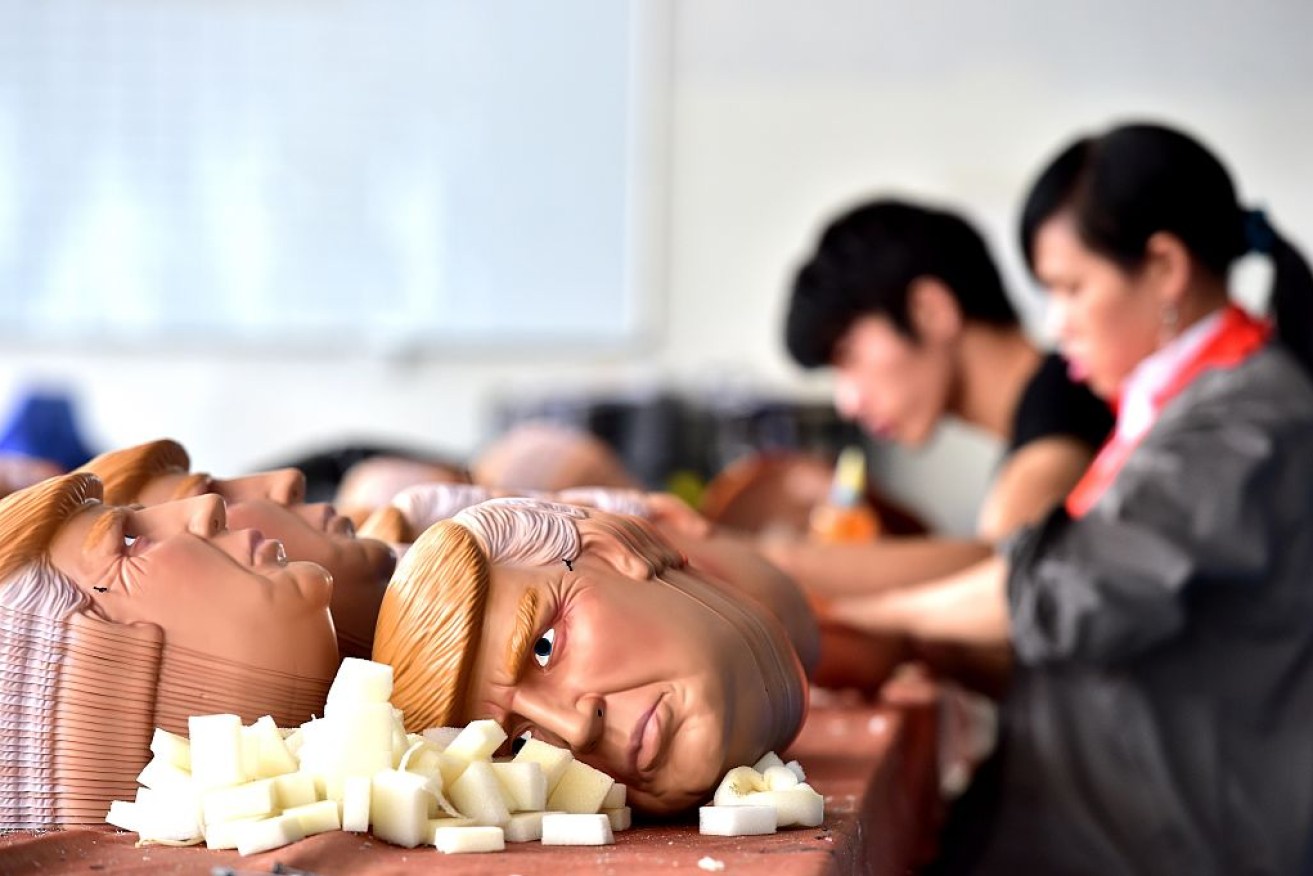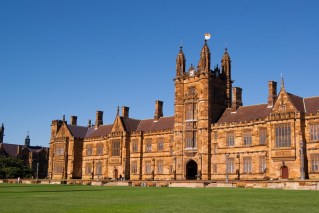Trump in ‘no rush’ as US-China trade war escalates, Beijing threatens retaliation

Masks of Donald Trump wait to be packed at a rubber mask factory in China. The US has hiked tariffs on $US200 billion of Chinese goods to 25 per cent. Photo: Getty Images
US President Donald Trump says he is in no hurry to sign a trade deal with China as Washington imposed a new set of tariffs on Chinese goods and negotiators began a second day of last-ditch talks to try to salvage an agreement.
The United States early on Friday increased its tariffs on $US200 billion ($286 billion) in Chinese goods to 25 per cent from 10 per cent, rattling financial markets already worried the 10-month trade war between the world’s two largest economies could spiral out of control.
The biggest Chinese import sector affected by the rate hike is a $US20 billion ($28 billion) category of internet modems, routers and other data transmission devices, followed by about $US12 billion ($17 billion) worth of printed circuit boards used in a vast array of US-made products.
Furniture, lighting products, auto parts, vacuum cleaners and building materials are also high on the list of products subject to the higher duties.
The move, which is expected to lead to Chinese retaliation, went into effect just hours before US trade representative Robert Lighthizer, US Treasury Secretary Steven Mnuchin and Chinese Vice Premier Liu He started a second day of talks in Washington.

Liu He leaves a meeting with top US and Chinese negotiators as they try to salvage a deal with more talks scheduled for Saturday. Photo: AAP
Mr Liu was seen leaving the US trade representative’s office near midday and it was not immediately clear if that signalled an end to the current round of negotiations.
In a series of morning tweets, Mr Trump defended the tariff hike and said he was in “absolutely no rush” to finalise a deal, adding that the US economy would gain more from the levies than any agreement.
“Tariffs will bring in FAR MORE wealth to our country than even a phenomenal deal of the traditional kind,” Mr Trump said in one of the tweets.
Talks with China continue in a very congenial manner – there is absolutely no need to rush – as Tariffs are NOW being paid to the United States by China of 25% on 250 Billion Dollars worth of goods & products. These massive payments go directly to the Treasury of the U.S….
— Donald J. Trump (@realDonaldTrump) May 10, 2019
Despite Mr Trump’s insistence China will absorb the cost of the tariffs, US businesses will pay them and likely pass them on to consumers.
Consumer spending accounts for more than two-thirds of US economic activity.
Global stocks, which have fallen this week on the increased US-China tensions, came under renewed pressure on Friday. Major US stock indexes were down more than 1 per cent and prices of US government debt rose. The US dollar slipped against a basket of currencies.
Mr Trump, who has adopted protectionist policies as part of his “America First” agenda and railed against China for trade practices he labels unfair, said the trade talks, originally due to end on Friday, could drag on beyond this week.
“We will continue to negotiate with China in the hopes that they do not again try to redo deal!” said Trump, who has accused Beijing of reneging on commitments it made during months of negotiations.
Tariffs will make our Country MUCH STRONGER, not weaker. Just sit back and watch! In the meantime, China should not renegotiate deals with the U.S. at the last minute. This is not the Obama Administration, or the Administration of Sleepy Joe, who let China get away with “murder!”
— Donald J. Trump (@realDonaldTrump) May 10, 2019
Following the US tariff hike, China’s Commerce Ministry said it would take countermeasures but did not elaborate.
China responded to Mr Trump’s tariffs last year with levies on a range of US goods including soybeans and pork, which hurt US farmers at a time when their debt has spiked to its highest level in decades.
US Agriculture Secretary Sonny Perdue said on Friday that Mr Trump asked him to create a plan to support the farmers. The US Department of Agriculture already has rolled out up to $US12 billion ($17 billion) to help offset farmers’ China-related losses.
Under the latest US action, US Customs and Border Protection imposed a 25 per cent duty on more than 5700 categories of products leaving China after 12.01am local time on Friday.
Seaborne cargoes shipped from China before midnight were not subject to the new tax as long as they arrived in the US prior to June 1. Those cargoes will be charged the original 10 per cent rate.

China Shipping Company containers are stacked at a US terminal after President Donald Trump’s latest tariff hike on Chinese goods took effect Friday. Photo: AAP
“This delay might create an unofficial window during which the US and China can continue to negotiate,” investment bank Goldman Sachs wrote in a note, adding that it was a “somewhat positive sign” that talks were continuing.
The grace period was not applied to three previous rounds of tariffs imposed last year on Chinese goods, which had much longer notice periods of at least three weeks before the duties took effect.
Investors worry the escalating trade war will further damage a slowing global economy. The higher tariffs could reduce US gross domestic product by 0.3 per cent and China’s by 0.8 per cent in 2020, consultancy Oxford Economics said.
Chief executive of the Consumer Technology Association Gary Shapiro said the tariffs would be paid by American consumers and businesses, not China, as Mr Trump claimed.
“Our industry supports more than 18 million US jobs – but raising tariffs will be disastrous,” Mr Shapiro said.
“The tariffs already in place have cost the American technology sector about $1 billion more a month since October. That can be life or death for small businesses and startups that can’t absorb the added costs.”








